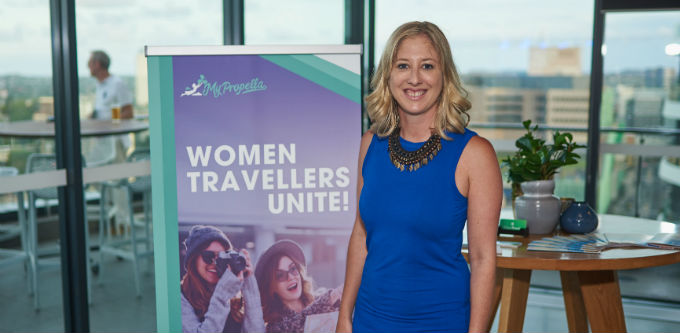
MyPropella founder Caitlin Brookes. Source: Supplied.
Whether exploring new horizons or re-treading old haunts, everyone loves to get out of town every now and then, and tourism is never going to go out of style.
But, when it comes to travel, what is there to do that hasn’t yet been done? Are there any opportunities left? Well, believe it or not, there are still paths untrodden that tech can help us tread.
The Horizons Accelerator Program, run by the Slingshot accelerator and sponsored by the Queensland government and travel IT provider Amadeus, set out to find startups doing just that.
The Horizons demo day at the end of last year showcased a range of early-stage startups addressing travel challenges, ranging from surplus space on private air travel to unsafe boating practices. Meanwhile, others strive to promote authentic Indigenous experiences or ethical service providers.
Here’s our pick of some of the most interesting startups to emerge from the program.
Rentality
Headed up by founders Joey Wong and Adrian Yong, Rentality is designed to fill the gap left between Airbnb and long-term property rental agencies. The startup provides a platform for finding and booking mid-term rental properties available for between one and nine months.

The Rentality team. Source: Supplied.
Aimed at the international student, new migrant and fly-in-fly-out worker market, Rentality is intended to provide more affordable properties, while property owners can achieve a higher rental yield with fewer regulatory barriers.
Now, the founders are hoping to scale the platform.
“We’re looking for industry experts, more supply of property and tenants, and business partnership and investments,” Wong said.
Deckee
Deckee founder Mike McKiernon views boating as part of Aussie culture, and has set out to make the waters safer, by helping sailors make better decisions relating to sea conditions, service providers and activity in the oceans.
The app offers an interactive map for scouting other vessels, marine weather forecasting tools and safety alerts, as well as giving users access to a community of like-minded seafarers.
Already, the site has more than 100,000 monthly visitors, and its Facebook page boasts some 3,000 followers. Deckee has also been endorsed by Transport for NSW as a recommended app for boaters.
“We’re planning to cross oceans and help boaters all over the world,” McKiernon said.
Apporiginee
Apporiginee founders Gudjugudju Fourmile and Jenny Lynch are on a mission to connect visitors to Australia with the country’s Indigenous culture, by providing what Fourmile called a “one-stop shop for booking authentic Indigenous experiences and products”.
Tours and experiences booked through the Apporiginee platform are run by members of local Indigenous tribes, allowing visitors to learn about ancient rock art or trek through rainforests. The app also helps visitors to Australia to purchase authentic gifts and produce made by Indigenous communities.

Apporiginee founders Gudjugudju Fourmile and Jenny Lynch. Source: Supplied.
The Indigenous community is something that’s unique to Australia, but “small scale operators are not very good at marketing themselves,” Lynch said.
“Our solution is that we bring it all together,” she added.
“We’ll connect you to those communities,” Fourmile said.
My Propella
Caitlin Brookes is working on building a global community of solo women travellers, through her startup MyPropella.
According to Brookes, many women travellers holiday alone, because of either circumstance or convenience, rather than choice. So, MyPropella strives to find them travel-buddies, matching pairs based on their travel personality, values and interests.
As a frequent solo traveller, “I know intimately what the motivators and barriers are for women travelling together”, Brookes said.
Brookes hopes to launch the app on International Women’s Day 2019, to help “propel women to reach new heights and explore new horizons”.
AirShare
AirShare is intended to make pleasure flights and chartered travel more accessible to everyday folk, by matching underutilised space on aircrafts with those with a desire to fly.
According to co-founder Gauranga Magriplis, there are about 210,000 “joy flights” taking off in Australia each year, and some 35% of these have empty seats.
In addition to this, the majority of the 395,000 chartered flights in Australia each year make their return leg completely empty.
AirShare provides a platform pairing potential customers with those flights, offering a discount, but still improving the bottom line of operators.
Since launching in October, the startup has formed three partnerships with operators spanning seven Aussie cities, and generated $2000 in revenue, Magriplis said. And from here on out, the sky’s the limit.
Clean Travel
Clean Travel is dedicated to helping small, ethical tourism operators reach a wider client-base, connecting socially-savvy travellers with services that provide a social, environmental or cultural benefit to their communities.

Clean Travel founder Macartan Gaughan presenting. Source: Supplied.
According to founder Macartan Gaughan, 90% of millennials say they would prefer to travel with ethical companies, but those companies often don’t have the time, or the skills, to market themselves online.
Clean Travel offers booking software to help providers manage their business and their customers, as well as distributing information to travel agents, globally. Finally, the startup offers support and advice to help businesses maximises, and maintain their reach.
“There’s nobody focusing on the exploding segment of ethical tourism,” Gaughan said.
“Together, these types of companies and the socially conscious travellers are changing what it means to travel, and we are connecting them,” he added.


COMMENTS
SmartCompany is committed to hosting lively discussions. Help us keep the conversation useful, interesting and welcoming. We aim to publish comments quickly in the interest of promoting robust conversation, but we’re a small team and we deploy filters to protect against legal risk. Occasionally your comment may be held up while it is being reviewed, but we’re working as fast as we can to keep the conversation rolling.
The SmartCompany comment section is members-only content. Please subscribe to leave a comment.
The SmartCompany comment section is members-only content. Please login to leave a comment.